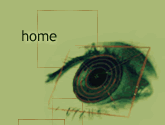|
Michael:
When we first met, you were, to put it kindly, not interested in
science or health or, for that matter, history or politics. I would
describe you then as something of a literary bohemian, very knowledgable
about contemporary poetry and music and art, and generally aware
of recent social and cultural events. But I'd have to say your disinterest
in the world of science and technology bordered on disdain. That's
all changed. I assume your interest in scientific ideas and discoveries
is connected to your need to learn about what's been happening to
your eyes.
|
|
Joel:
Okay, so I was an artsy semi-ignoramus. Two factors, besides aging,
inspired new intellectual enthusiasm: becoming legally blind; and
achieving Internet and Web access to broader, deeper knowledge.
I discovered an online forum, the RP List, where science professionals
like Dr. Gislin Dagnelle of Johns Hopkins and Foundation Fighting
Blindness information specialist Tom Hoglund contribute details
about retinal degeneration and the efforts to analyze and cure it.
My interest soon extended to the mechanics and neurology of vision,
cellular biology, stem cell and gene therapy research, and more,
abetted by another subscriber who generously compiles each Tuesday's
New York Times Science News as a text file and distributes it free.
But the lure of the Web is strong, and one thing leads to another,
given enough solitude and time, which circumstances have afforded
me in spades. Thus, a general erudition, however modest, beyond
my youthful imaginings, in many areas.
|
|
Michael
:
So, your need to know about what was going wrong inside your eyes
led you to scientific explanations, which in turn led to more and
broader interest in science. Is that kind of knowledge--the understanding
of how things work--of much practical value to you? Or is it mostly
the pleasure of learning and understanding?
|
|
Joel
:
"Practical value?" You mean some way in which my interest in
the causes and mechanics of retinal degeneration, and about
research, could lead me to a cure or at least uncover palliative
measures to slow down the progression of my RP and lessen its
effects? It's not that I didn't have such hopes at first. But
it wasn't long before I understood that the work toward finding
a cure was advancing haltingly, due at least as much to funding
shortfalls as to the complexity of the scientific challenge.
And treatments such as vitamin therapy and nutritional supplementation
turn out to be of questionable value. Regardless, becoming aware
of developments in such areas as cellular biology,
|
|

Joel
on his particular
pattern of retinitis pigmentosa
|
|
|
genetics and neurology has added to the store of knowledge that
increases my understanding not only of my particular situation
but of all living things. A large profit, cure or no cure.
|
|
|
|
|







